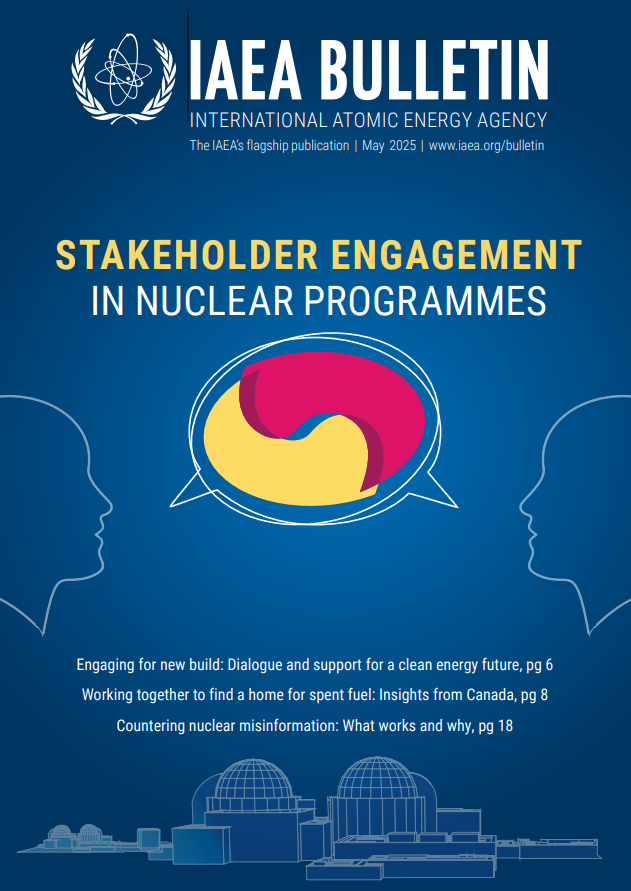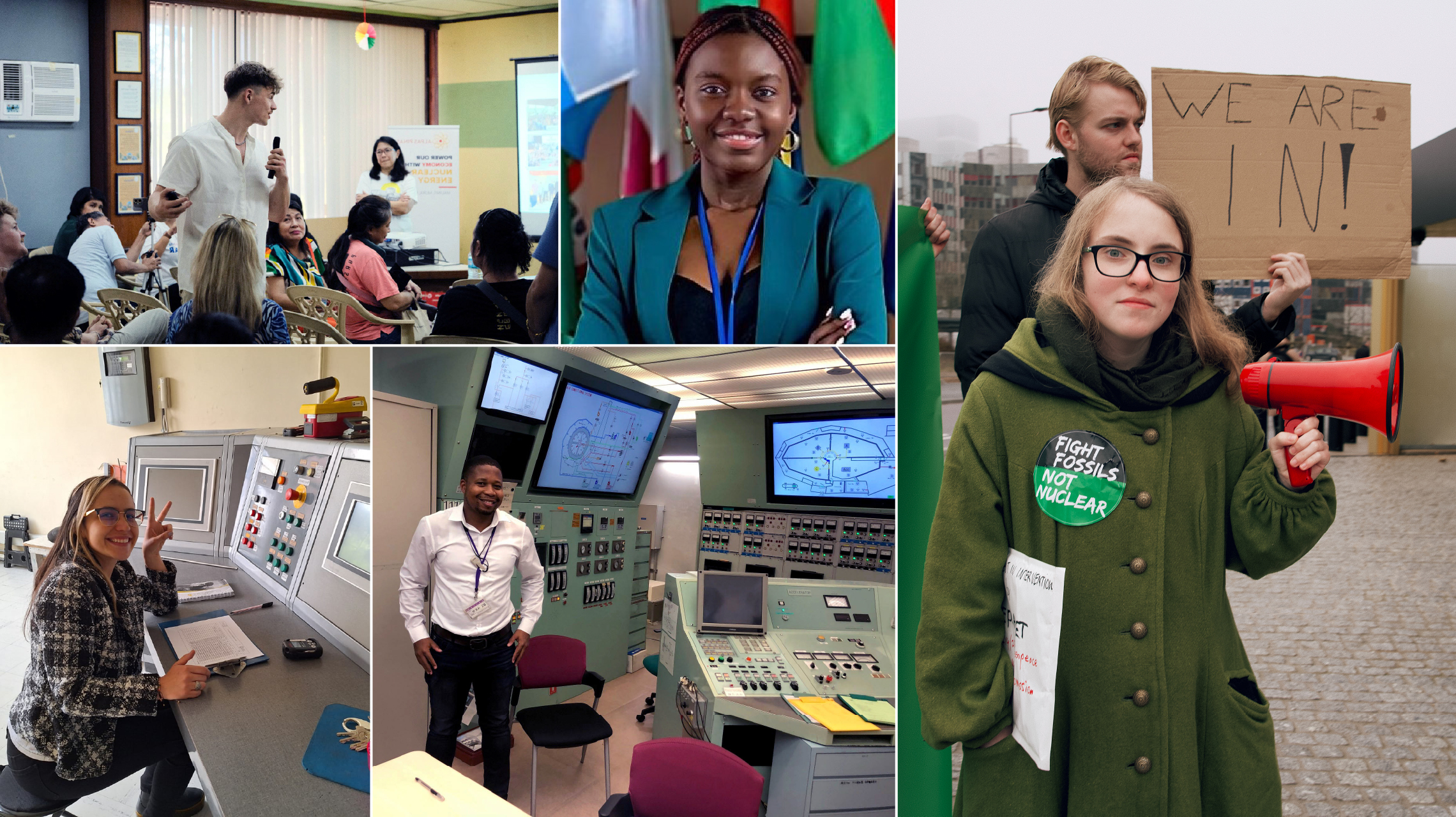La conversación en torno a la energía nuclear, desde los reactores modulares peque?os hasta el uso de la energía nucleoeléctrica como fuente energética de los centros de datos, está cambiando y está dando paso a voces nuevas y más jóvenes. Para ellos, la energía nuclear es un campo de innovación que ofrece soluciones a algunos de los mayores problemas a los que se enfrenta el mundo: la seguridad energética, el desarrollo económico y el cambio climático. El OIEA habló con jóvenes de todo el mundo para saber por qué apoyan la energía nucleoeléctrica.
“Los jóvenes hoy día crecen con una ansiedad constante por la degradación del clima y del medio ambiente —afirma Mads Bunch Larsen, de 28 a?os, del proyecto danés de educación climática Foreningen Atomkraft Ja Tak—. Pero también tenemos muchas más pruebas científicas de que la energía nucleoeléctrica es segura y una herramienta eficaz para mitigar el cambio climático al tiempo que garantiza una energía fiable”.
En todo el mundo, los jóvenes han impulsado protestas para que se actúe contra el cambio climático, y muchos ven en la energía nucleoeléctrica una herramienta clave para mitigarlo. La energía nucleoeléctrica ya suministra alrededor de una cuarta parte de la electricidad con bajas emisiones de carbono del mundo, ofreciendo una energía fiable y distribuible que puede complementar a fuentes renovables como la eólica o la solar.
“Aunque abogan por las energías renovables, muchos responsables de la formulación de políticas a menudo pasan por alto su intermitencia: la energía solar y la eólica dependen de las condiciones meteorológicas y necesitan una fuente de reserva estable cuando no están generando electricidad”, explica Nicole Mikly, de 30 a?os, responsable en materia de medio ambiente y participación de las partes interesadas en una instalación de investigación nuclear de Colombia.
El Sr. Larsen se mostró especialmente entusiasmado con las aplicaciones no eléctricas de la tecnología nuclear, como la descarbonización de la calefacción y el transporte pesado. “La energía nuclear está en condiciones de suministrar calor e hidrógeno a este tipo de aplicaciones como ninguna otra fuente”, dice.
En los últimos cinco a?os, el interés en la energía nuclear ha crecido considerablemente. Desde 2020, las perspectivas del OIEA relacionadas con la energía nucleoeléctrica no han dejado de mejorar, y actualmente se prevé que la capacidad nuclear mundial se multiplicará 2,5 veces desde los niveles de 2023 hasta 2050, según la hipótesis alta del OIEA.
?Cuál es el desafío? Crear una fuerza de trabajo del ámbito nuclear en la que las generaciones más jóvenes puedan desempe?ar un papel central. El informe de 2025 de Global Energy Talent Index, una encuesta a personas que trabajan en el sector nuclear en 150 países, muestra que la proporción de encuestados menores de 35 a?os disminuyó al 37 % en 2025 en comparación con un 48 % en 2023.
Las mujeres representan solo una cuarta parte de la fuerza de trabajo del sector nuclear, según un informe de la Agencia de Energía Nuclear de 2023. El OIEA está tratando de cambiar esta situación mediante iniciativas como el Programa de Becas del OIEA Marie Sk?odowska-Curie (MSCFP), que ofrece ayuda económica a mujeres que cursan estudios de maestría en temas relacionados con la energía nuclear, y el Programa Lise Meitner, que apoya a mujeres que se encuentran a mitad de su carrera profesional y trabajan en el ámbito nuclear.
Flora Mbouyom, del Camerún, estudió energía nuclear en el IMT Atlantique Bretagne-Pays de la Loire de Francia con ayuda del programa MSCFP. Esta joven de 24 a?os tiene previsto trabajar en la gestión de desechos una vez que termine su doctorado. “Siempre me sorprende ver cómo la gente teme más a los desechos radiactivos que a todos los problemas causados por la falta de energía”, afirma.
El miedo y la información errónea son algunos de los principales obstáculos a la expansión mundial de la energía nuclear, según muchos de los jóvenes con los que habló el OIEA.
“Recuerdo perfectamente que de ni?o me aterrorizaba la radiación porque había visto un reportaje en televisión sobre Chornóbil”", dice el Sr. Larsen.
Emmanuel Montwedi, de 37 a?os, analista de ingeniería nuclear de la South African Nuclear Energy Corporation, coincide. “La generación anterior hizo que el tema de la energía nuclear pareciera demasiado serio y aterrador”, dice.
El Sr. Larsen se dio cuenta del potencial transformador de la energía nuclear mientras estudiaba macroeconomía en la universidad. “Recuerdo que me sorprendió la cantidad de energía limpia que se producía en países como Suecia, Francia y Suiza, todos ellos muy dependientes de la energía nuclear y de algunas centrales hidroeléctricas”, explica. Los tres países han descarbonizado en gran medida su producción de electricidad gracias a la energía nuclear y la energía hidroeléctrica.
La activista del clima, Ia Sra. Aanstoot, sueca de 20 a?os, se?aló la falta de soluciones de financiación a gran escala como uno de los principales obstáculos para la adopción de la energía nuclear, tanto en Europa como en el Sur Global. Sin embargo, tanto el Sr. Montwedi como la Sra. Aanstoot describieron el futuro de la energía nuclear como “apasionante”, y la Sra. Aanstoot destacó el “enorme potencial” de la energía nuclear para afrontar los retos más acuciantes del mundo, desde la pobreza hasta la crisis climática.
La actitud hacia la energía nuclear está cambiando. Además de reducir las emisiones, la energía nucleoeléctrica crea empleo, fortalece las economías e impulsa la innovación. A medida que evoluciona, el sector atrae y necesita una nueva generación de pensadores y personas que resuelvan problemas y aboguen por forjar un futuro más resiliente.

